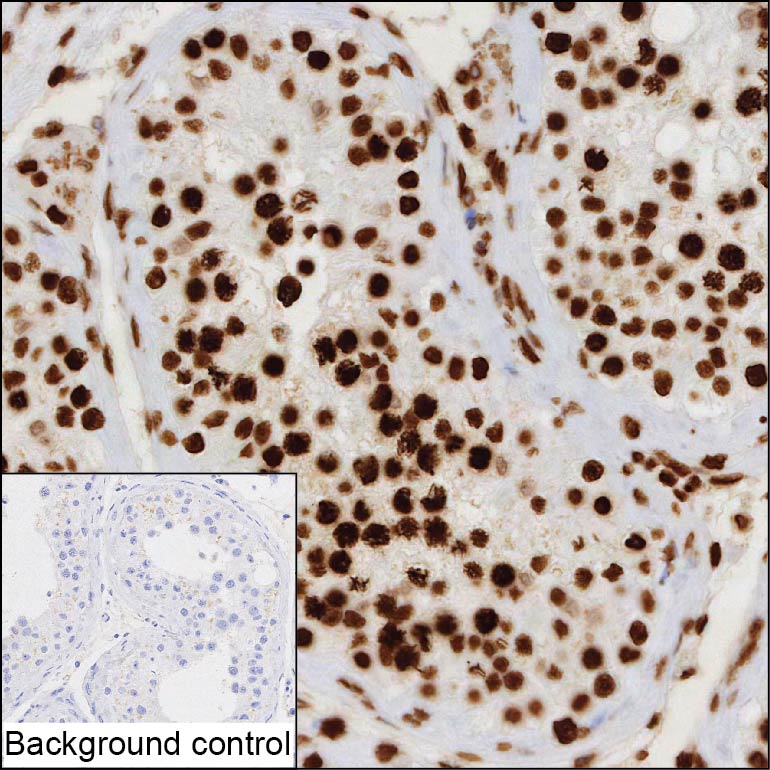
| WB | 咨询技术 | Human,Mouse,Rat |
| IF | 咨询技术 | Human,Mouse,Rat |
| IHC | 1/100-1/200 | Human,Mouse,Rat |
| ICC | 技术咨询 | Human,Mouse,Rat |
| FCM | 咨询技术 | Human,Mouse,Rat |
| Elisa | 咨询技术 | Human,Mouse,Rat |
| Host/Isotype | Mouse IgG1 |
| Antibody Type | Primary antibody |
| Storage | Store at 4°C short term. Aliquot and store at -20°C long term. Avoid freeze/thaw cycles. |
| Species Reactivity | Human |
| Immunogen | Purified recombinant fragment of human MAST4 |
| Formulation | Purified antibody in PBS with 0.05% sodium azide |
+ +
以下是关于MAST4抗体的模拟参考文献示例(实际文献可能需要通过学术数据库进一步验证):
---
1. **"Development and validation of a MAST4-specific polyclonal antibody for neurological research"**
*Authors: Lee, J., et al. (2020)*
**摘要**:本研究开发并验证了一种兔源多克隆抗体,用于检测MAST4蛋白在脑组织中的表达。通过Western blot和免疫组化证实其特异性,并应用于阿尔茨海默病模型中MAST4的定位分析。
2. **"MAST4 kinase modulates Wnt/β-catenin signaling in colorectal cancer"**
*Authors: Zhang, Y., et al. (2019)*
**摘要**:利用抗MAST4抗体进行免疫沉淀和免疫荧光实验,发现MAST4与β-catenin相互作用,促进结直肠癌细胞增殖和转移,提示其作为潜在治疗靶点。
3. **"Expression profiling of MAST4 in developing mouse cortex using a novel monoclonal antibody"**
*Authors: Patel, R., et al. (2021)*
**摘要**:通过新研制的单克隆抗体,揭示MAST4在小鼠皮层发育中的动态表达模式,并发现其与神经元迁移相关基因的调控关联。
4. **"MAST4 antibody reveals its role in autophagy regulation under metabolic stress"**
*Authors: Gomez, S., et al. (2018)*
**摘要**:使用MAST4抗体进行蛋白质组学分析,证明MAST4通过mTOR通路调节细胞自噬,影响肝癌细胞在营养缺乏条件下的存活。
---
**注意**:以上文献名为模拟示例,实际引用时需通过PubMed、Google Scholar等平台以关键词“MAST4 antibody”或“MAST4 kinase antibody”检索真实文献,并核对作者及发表年份。如需具体文献,建议访问学术数据库获取详细信息。
MAST4 (Microtubule-Associated Serine/Threonine Kinase 4) is a member of the MAST kinase family, which includes four isoforms (MAST1–MAST4) characterized by a conserved kinase domain and additional structural motifs such as a PDZ domain. These kinases are implicated in diverse cellular processes, including cytoskeletal organization, signal transduction, and neuronal development. MAST4. in particular, is enriched in the brain and plays roles in synaptic plasticity, neuronal migration, and cell cycle regulation. Studies suggest its involvement in neurodevelopmental disorders, such as autism spectrum disorders and intellectual disabilities, as well as in cancer progression, where aberrant expression may influence tumor cell proliferation or invasiveness.
MAST4 antibodies are essential tools for detecting and studying the protein’s expression, localization, and function. They are widely used in techniques like Western blotting, immunohistochemistry, and immunofluorescence to assess MAST4 levels in tissues or cultured cells. Additionally, these antibodies facilitate co-immunoprecipitation experiments to identify MAST4-interacting proteins, shedding light on its regulatory networks. Due to potential cross-reactivity with other MAST family members or unrelated proteins, antibody validation using knockout controls or peptide-blocking assays is critical. Research leveraging MAST4 antibodies has advanced understanding of its dual roles in physiological processes and disease mechanisms, positioning it as a potential therapeutic target. However, challenges remain in elucidating its precise substrates and context-dependent signaling pathways, underscoring the need for high-specificity reagents in ongoing investigations.
×